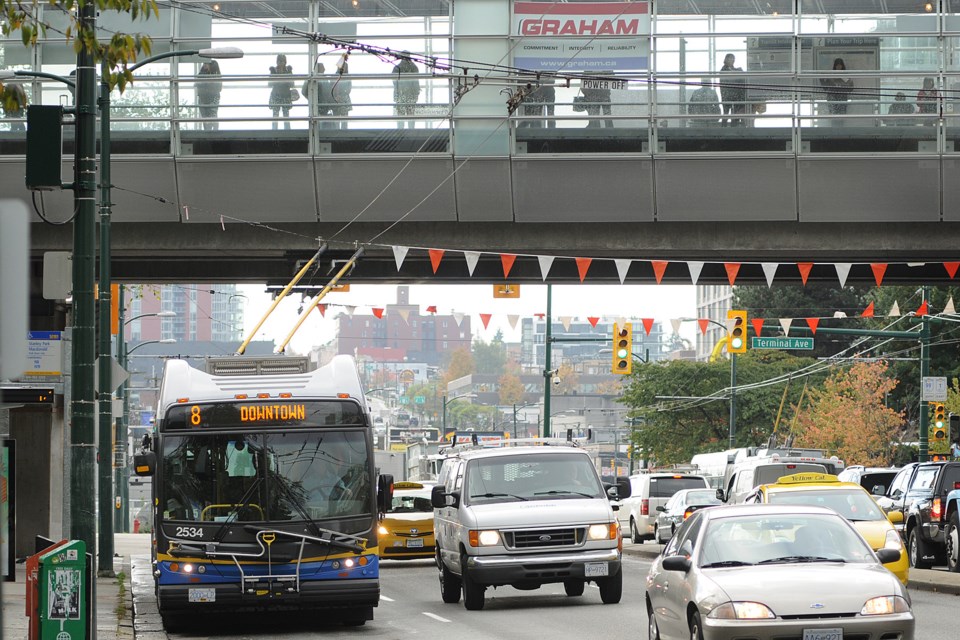Mayors from around the region approved a referendum question Thursday for Metro Vancouver residents that calls for a slight increase to the provincial sales tax to help pay for a $7.5 billion plan that includes a Broadway subway, increases to bus service and upgrades to major roads.
The yes or no question: Do you support a one half percentage point (0.5) increase to the provincial sales tax in Metro Vancouver dedicated to the mayors' transportation and transit plan, with independent audits and public reporting?
The mayors say the increase to the existing seven per cent sales tax would cost an average Metro Vancouver household about $125 a year, and $50 a year for lower-income households. The funding would contribute $250 million a year to the plan.
The referendum, which the provincial government says is necessary to introduce the tax hike, would see Metro Vancouver residents cast a mail-in ballot likely beginning in mid-March. Results would likely be announced in May and the hike could be in effect for early 2016.
The mayor's plan, however, still faces two significant hurdles: the provincial cabinet must approve the wording of the question and senior levels of government have to match contributions of the region's taxpayers.
North Vancouver District Mayor Richard Walton, head of the mayors' council, said he was confident the government would approve the question, which is expected to go before the cabinet next week.
"I think so," he told reporters after 17 mayors, Tsawwassen First Nation Chief Bryce Williams and Local Area A director Maria Harris approved the ballot question at a meeting held at the Anvil Centre in New Westminster. "We've been working fairly closely with the ministry to make sure there were no surprises at the last minute, so I think cabinet has a pretty good idea of what we put forward today."
Transportation Minister Todd Stone told reporters in a conference call after the meeting that he thought "the mayors have hit the mark, for the most part, with this question and I applaud them for that." Stone said the question might be refined or tweaked before he replies to the mayors' council "on this side of Christmas."
The analysis his government will conduct over the next few weeks will include concerns of "leakage" of consumers looking to shop outside the Metro Vancouver region to avoid a new tax hike. But, he added, there is no perfect funding source.
"The mayors have done a good job — they've come together and they've united behind this series of priorities and a plan that I think the region can get behind," he said.
Mayor Gregor Robertson, who made building a Broadway subway one of his top re-election campaign priorities, said he believes a positive result from the referendum will trigger senior levels of government to contribute the $3.9 billion requested in the plan.
"I'm very hopeful that if the referendum passes — people of Metro Vancouver speak loud and clear that we want a transit investment — that the provincial and federal governments will respond with the funding that's needed," Robertson told reporters.
An estimated $1.9 billion will be required from the region and senior levels of government to build a 5.1-kilometre subway line from the Vancouver Community College-Clark SkyTrain station to Arbutus Street. Annual operating costs are estimated at $22.3 million.
Burnaby Mayor Derek Corrigan was one of three mayors to vote against the ballot question. Corrigan was the only mayor to vote against the mayors' plan when it was approved in June.
"It's a big problem to present an overly ambitious plan — one that is looking to gather support from every direction by giving everybody what they want when realistically knowing that you can't accomplish it," he said, noting there is no guarantee senior governments will contribute to the plan. "The deal killer for me in this is while we're out there making promises to the public about a transportation vision we don't have the ability to govern TransLink. We are simply the mayors' council, which is a funding source...and it doesn't control the annual budget. So we don't set the priorities."
The mayors who supported the plan got a boost Wednesday from the announcement that a broad coalition had formed to support the referendum. Called the Better Transit and Transportation Coalition, it includes business, labour, environmental, community and other organizations that will urge residents to vote yes in the referendum.
At Thursday's meeting, Iain Black, CEO of the Vancouver Board of Trade, spoke on behalf of the coalition to mayors before the vote. He said the organizations have come together to fight the "common enemy" of congestion which affects transit users, truck drivers and businesses. Congestion is also the number one source of greenhouse gas emissions in the region, he added.
"In our view, doing nothing is not an option," Black said. "If we do nothing, this congestion will only get worse."
Other investments in the plan for Vancouver include new B-line buses from downtown to Southeast Marine drive, downtown to Simon Fraser University's main campus in Burnaby and from Joyce-Collingwood to UBC. Total capital cost is estimated at $21.9 million and an operating cost of $11.1 million.
More frequent bus, SeaBus and HandyDart service is called for, as are continued investments in cycling and pedestrian infrastructure and road maintenance. The timing for the subway to be built is in the six to 10-year range of the plan — the same timeframe for a $1.9 billion light-rail project in Surrey. A new four-lane Pattullo Bridge for New Westminster at $980 million is the other big expense outlined in the plan and calls for tolls once it is built.
One million more people are expected to move into the region by 2040. That's roughly the population of Port Coquitlam moving in every year until 2040. A majority of newcomers are expected to settle in Surrey.



